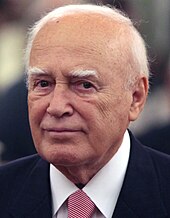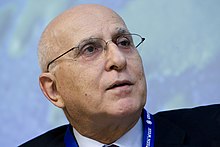Presidential election in Greece 2014/2015
The 9th election as Greek President took place in the second half of December 2014 and mid-February 2015. In the first three ballots, the candidate Stavros Dimas failed to achieve the required majority in the Greek parliament . According to the Greek constitution , the parliament was dissolved and a general election was scheduled for January 25, 2015 . Another election round took place in the newly elected parliament, in which Prokopis Pavlopoulos was elected as the new head of state. He took office on March 13, 2015.
legal framework
The election of the head of state is regulated in Article 32 of the Greek Constitution. President Karolos Papoulias has been in office since March 2005 and was no longer allowed to run after two five-year terms. The election had to take place at least one month before the end of the term of office of the incumbent President (Article 32 (1)); the government of Andonis Samaras ( Samaras cabinet ) decided on December 9, 2014 to bring the election forward to December 2014. The election was made by the Greek parliament. A two-thirds majority was required in the first and second ballots; this corresponded to 200 votes out of 300. If the election fails in the first two rounds, a number of votes of 180 is required in the third attempt. If this fails too, parliament must be dissolved within ten days and new elections follow. After a possible new election, three more ballots are conceivable: First 180 votes would be required again, then only 151. In the last ballot, the two candidates with the most votes would run against each other; the candidate with the most votes will ultimately win the election.
Political background
Political life has been shaped by the sovereign debt crisis since 2010 . In the second half of 2008 (as in some other countries) an economic crisis began, which was triggered , among other things, by a banking crisis . Since then, the unemployment rate in Greece (and in other southern countries of the euro zone high). The government under Prime Minister Samaras was responsible for the implementation of the aid packages and the associated austerity measures from the conservative Nea Dimokratia (ND) party , which had governed with the social democratic PASOK since the parliamentary elections in June 2012 ; the left-wing party DIMAR had already left the coalition in mid-2013. The various opposition parties oppose the austerity measures demanded by the donors to varying degrees. After enormous gains in the past, the left opposition party SYRIZA had the opportunity to finally become the strongest force in new elections for the first time, which is why its chairman Alexis Tsipras failed the presidential elections in order to force them. Since the two parties of the governing coalition only had 155 of the 300 MPs, they would have needed votes from opposition MPs to elect Dimas. She tried to win MPs from DIMAR and ANEL as well as non-party members.
Samaras had hoped to have led Greece out of the rescue program by the end of 2014. Since his visit to Berlin in September 2014, he has repeatedly said that Greece has come through the painful reforms and will soon be able to finance itself on the international capital markets again without the help of the Troika (EU, ECB, IMF) (i.e. take out loans to pay off debts due and to cover the net new debt ). The fifth evaluation of the Memorandum on the Adjustment Program with the Troika began in September 2014. The Troika insisted on the goal of achieving a primary surplus of three percent of gross domestic product in the Greek national budget in 2015 . The Samaras government submitted a draft with a primary surplus of only 2.34 percent. Previously, Samaras had also cut some taxes without consulting the Troika. The Troika insisted on implementing agreed reforms (social security system and labor law). Only after completion of the evaluation could the last tranche of 1.8 billion euros be paid out and a successor arrangement agreed.
Candidates
On December 9th, Samaras proposed former Foreign Minister and EU Environment Commissioner Stavros Dimas as a candidate for the presidency. The Dimokratiki Aristera (DIMAR) and the right wing Anexartiti Ellines (ANEL) announced their opposition to a coalition candidate. It has been speculated that DIMAR's chairman, Fotis Kouvelis , could run as a candidate for the highest office after the parliamentary elections .
After the parliamentary elections in January 2015 there were numerous rumors that SYRIZA could nominate Dimitris Avramopoulos , ND member and EU commissioner, i.e. a politician with a practically opposite attitude compared to SYRIZA's positions, as a candidate. This could bring about a reconciliation with the conservative party and fill the vacant post of commissioner herself. On February 17th, Alexis Tsipras nominated Prokopis Pavlopoulos , a former interior minister and member of the ND, instead . On the same day Potami presented the professor of constitutional law Nikos Alivizatos as an opponent.
Composition of Parliament
Composition in December 2014
| Political party | Seats | Proportion of % |
|---|---|---|
| New Democracy (ND) | 127 | 42.33 |
| SYRIZA - Enotiko Kinoniko Metopo (SYRIZA) | 71 | 23.67 |
| Panellinio Sosialistiko Kinima (PASOK) | 28 | 9.33 |
| Anexartiti Dimokratiki Vouleftes | 17th | 5.66 |
| Chrysi Avgi (XA) | 16 | 5.33 |
| Anexartiti Ellines (ANEL) | 12 | 4th |
| Communist Party of Greece (KKE) | 12 | 4th |
| Dimokratiki Aristera (DIMAR) | 10 | 3.33 |
| non-attached | 7th | 2.33 |
| total | 300 | 100 |
Composition in February 2015
| Political party | Seats | Proportion of % |
|---|---|---|
| SYRIZA - Enotiko Kinoniko Metopo (SYRIZA) | 149 | 49.67 |
| New Democracy (ND) | 76 | 25.33 |
| Chrysi Avgi (XA) | 17th | 5.67 |
| To Potami | 17th | 5.67 |
| Communist Party of Greece (KKE) | 15th | 5.00 |
| Anexartiti Ellines (ANEL) | 13 | 4.33 |
| Panellinio Sosialistiko Kinima (PASOK) | 13 | 4.33 |
| total | 300 | 100 |
Election result
In the first roll-call vote on December 17, 2014, the only candidate Stavros Dimas did not receive the required 200 votes, but with 160 votes more than that of the governing coalition of New Democracy and PASOK. 135 MPs abstained, 5 MPs did not run to vote. The next vote was scheduled for December 23rd.
After Dimas' election failed in the first round, Prime Minister Samaras tried to convince the opposition with compromise proposals. According to this, in 2015, after the negotiations with international donors have been concluded, government participation with pro-European opposition members and early parliamentary elections at the end of 2015 would be envisaged.
On December 23rd, 168 MPs voted for Dimas in the second ballot. 131 MPs abstained.
In the third ballot on December 29th, Dimas did not receive the required number of votes with 168 votes. As a result, parliament had to be dissolved and new elections had to be scheduled.
After the parliamentary elections in January 2015, the fourth ballot took place on February 18. Prokopis Pavlopoulos received 233 votes from among SYRIZA, ANEL and ND and was thus elected as the new head of state. His opponent Nikos Alivizatos only got 30 votes from PASOK and Potami.
| candidate | 1st ballot | 2nd ballot | 3rd ballot | 4th ballot | ||||
|---|---|---|---|---|---|---|---|---|
| be right | proportion of | be right | proportion of | be right | proportion of | be right | proportion of | |
| Stavros Dimas | 160 | 53.33% | 168 | 56.00% | 168 | 56.00% | - | - |
| Prokopis Pavlopoulos | - | - | - | - | - | - | 233 | 77.67% |
| Nikos Alivizatos | - | - | - | - | - | - | 30th | 10.00% |
| abstention | 135 | 45.00% | 131 | 43.67% | 132 | 44.00% | 32 | 10.67% |
| Absent | 5 | 1.67% | 1 | 0.33% | - | - | 5 | 1.67% |
Others
Eight of the 16 MPs of the Chrysi Avgi party were in custody at the time of the election on suspicion of membership in a criminal organization. A court order allowed them to take part in the three ballots.
After the election failed for the third time on December 29, 2014, and it was therefore clear that parliament would soon be dissolved, the prices of Greek government bonds fell on the Athens stock exchange . For example, the yield on Greek ten-year bonds rose to more than nine percent.
The Athex Composite Share Price Index closed on December 29th, four percent lower than on the previous trading day.
Web links
Footnotes
- ↑ [1]
- ↑ Δήλωση του Πρωθυπουργού κ. Αντώνη Σαμαρά, primeminister.gov.gr (Greek); Presidential election in Greece is preferred Deutsche Welle
- ↑ a b Article 32 (3)
- ↑ a b Article 32 (4)
- ↑ [2]
- ↑ Difficult choice for Stavros Dimas Deutsche Welle, December 17, 2014
- ↑ spiegel.de September 23, 2014: Samaras visit to Merkel: Greece wants to get along without new aid
- ↑ a b FAZ.net December 29, 2014: failure with announcement
- ↑ spiegel.de September 11, 2014: Last Troika mission in Greece: "What should we do without the barbarians?" - The rescue package for Greece is running out, Prime Minister Samaras has announced the end of paternalism. For many Greeks, this is more of a cause for concern: They trust the donors more than their government.
- ↑ spiegel.de November 24, 2014: Troika talks: Greece is fighting for further support
- ↑ spiegel.de November 22, 2014: Meeting with Merkel: Samaras rules out new loans to Greece
- ^ Stavros Dimas to become President of Greece, Wall Street Journal
- ↑ [3]
- ↑ [4]
- ↑ [5]
- ↑ http://www.tagesschau.de/ausland/pavlopoulos-nominierung-101.html ( Memento from February 18, 2015 in the Internet Archive )
- ↑ [6]
- ^ No new president in Athens yet Deutsche Welle, December 17, 2014; Dimas fails in the first attempt Süddeutsche.de, December 18, 2014
- ↑ Δήλωση του Πρωθυπουργού κ. Αντώνη Σαμαρά primeminister.gov.gr, December 21, 2014 (Greek); Deutsche Welle , December 23, 2014: Second attempt at presidential election in Greece
- ↑ Second attempt at presidential election failed Deutsche Welle, December 23, 2014
- ↑ [7]
- ↑ spiegel.de December 29, 2014
- ↑ [8]
- ↑ No votes are not possible.
- ↑ December 23, 2014: 853.2; December 29: 819.81. Source: www.helex.gr

